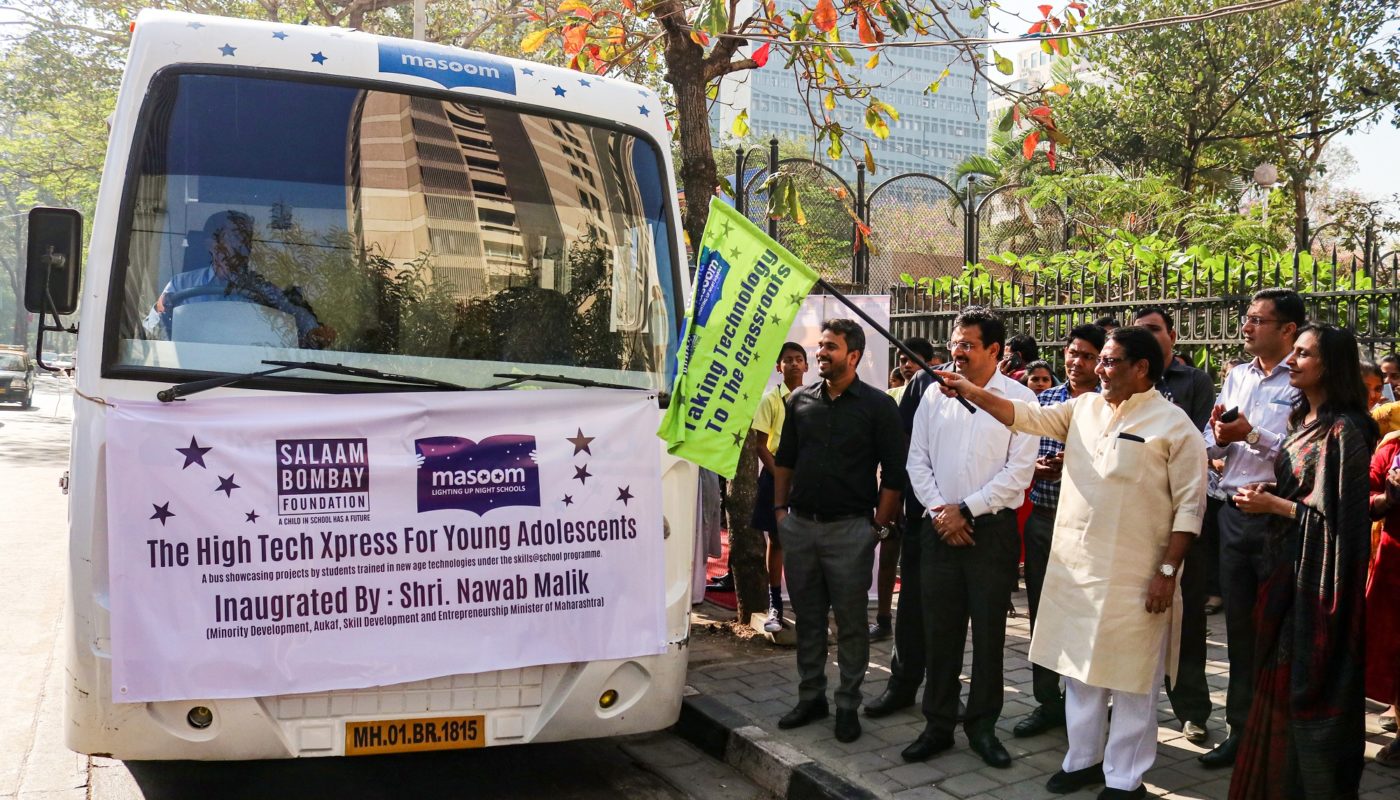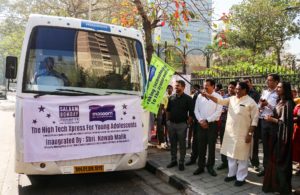Salaam Bombay Foundation Celebrates National Science Day

On National Science Day, tech innovations by government school students set to inspire 3,000 other children
“The High Tech Xpress For Young Adolescents” will move from school to school showcasing projects created by BMC school children using new age technologies
 Mumbai, 28th February 2020: Enter 2020, and the world has discovered ultrasonic sensor-enabled gloves that can detect the proximity of an obstacle from the visually impaired and beep to alert them. The frequency of the beep increases when the person moves closer to the obstacle. An Arduino Uno Micro Controller based robot prototype is designed for patients in isolated wards, the elderly and differently-abled. Using a torch light on the LDR panel of the robot, the robot moves and grips medicines, water bottle etc. and fetches the same to the patient. What might seem like scenes from science fiction episodes of yester-years is now a reality. What is more intriguing is that these are creations of children from resource poor backgrounds.
Mumbai, 28th February 2020: Enter 2020, and the world has discovered ultrasonic sensor-enabled gloves that can detect the proximity of an obstacle from the visually impaired and beep to alert them. The frequency of the beep increases when the person moves closer to the obstacle. An Arduino Uno Micro Controller based robot prototype is designed for patients in isolated wards, the elderly and differently-abled. Using a torch light on the LDR panel of the robot, the robot moves and grips medicines, water bottle etc. and fetches the same to the patient. What might seem like scenes from science fiction episodes of yester-years is now a reality. What is more intriguing is that these are creations of children from resource poor backgrounds.
National Science Day is celebrated each year on February 28 across India to mark the discovery of the ‘Raman Effect’ by Indian physicist Sir C. V. Raman in 1928. Deriving inspiration from the great scientist and one of the landmark discoveries of the last millennium, Salaam Bombay Foundation in association with NGO Masoom, flagged off “The High Tech Xpress” on Friday.
“The High Tech Xpress for Young Adolescents” is a unique initiative that will display projects created by students from Brihanmumbai Municipal Corporation (BMC) and Pune Municipal Corporation (PMC) schools on two buses. These buses will hop from school to school in Mumbai over a period of one week in a bid to reach out to over 3,000 students and inspire them through the projects created by their peers. The projects include a number of innovations like Line Follower, Smart Glove for Visually Impaired, Toto – The Robot, P10 Board Display, Keypad Lock, Water Dispenser, Hospital Robot Prototype, 3D Printing Machine and IOT based Home Automation system.
The buses were flagged off by Shri. Nawab Malik – Minority Development, Aukaf, Skill Development and Entrepreneurship Minister of Maharashtra from Nariman Point. He said, “Given the government’s emphasis on skill development, preparing for 21st-century careers requires training in new-age technologies. NGOs like Masoom and Salaam Bombay Foundation are strengthening the government’s mission by training adolescents in government and government-aided schools, where otherwise they may find it difficult to avail of these opportunities for skilling.”
The adolescent students, who have created the projects, have been trained in Robotics, Internet of Things (IoT) and Artificial Intelligence (AI). The trainings have helped them hone their skills in new age technology based courses. It has also provided them with a platform to explore avenues beyond textbooks and their regular school curriculum. It has acted as a catalyst in making them more confident and at par with their counterparts from privileged backgrounds – thus creating a level playing field. Science is an important pillar of the education system and the ever-evolving technological revolution plays a crucial role in shaping the progress, growth and development of the country.
Intelligent automation is poised to catapult the Indian economy to US $ 5 trillion dollars in the next five years, up from $2.7 trillion dollars, according to a new study commissioned by Automation Anywhere. Automation in today’s times is driving efficiencies for enterprises, resulting in dramatic productivity gains in the back office and enhanced customer experiences in the front office.
According to a study conducted by Ernst and Young India (EY), the country will experience a significant boost to its economy to reach US $5 trillion by as early as 2024. The research examined the economic impact of automation and found that large-scale adoption of automation technologies, such as Robotic Process Automation (RPA), artificial intelligence, natural language processing and machine learning will drive increased efficiencies and new jobs resulting in economic growth in the next few years.
The Union Budget 2020 also focussed on skill development as the most important factor along with job creations. In this direction, the government is currently running multiple campaigns to promote skilling among the youth in the early stages of schooling in the country. One of these is the Atal Tinkering Labs initiative that aims to equip students with innovative skills through hands-on learning. It is an ambitious move, as it has so far reached out to 5,441 schools. NGOs like Salaam Bombay Foundation are in sync with such initiatives through programmes like skills@school which works on similar lines and helps in scaling up students from low resource backgrounds through training and skill building in new age technology.
Speaking about the initiative, Gaurav Arora, VP, Salaam Bombay Foundation, said, “At Salaam Bombay Foundation, our aim is to bridge the skill gap between privileged students and those from resource poor backgrounds. Every year, we train students through our skills@school programme and make them ready for a brighter future. Technology encompasses all walks of lives and the next wave of digitisation will witness many more innovative models which will benefit the society as a whole. Salaam Bombay Foundation students are quick to adapt to this trend and hence we work extensively towards their training and skill development as we know that they are capable of doing wonders if they are provided with the right opportunities.”
About Salaam Bombay Foundation: Salaam Bombay Foundation started in 2002 to work with 12 to 17 year old adolescent children growing up in Mumbai’s slums. These children live in extreme poverty and in “at risk” environments. The municipal schools they go to do not have the resources to give them individual attention, career guidance or access to activities that stimulate the mind. Many are undernourished and face the risk of substance abuse. They come from financially challenged homes and are pressured to drop out of secondary school and seek jobs to support their families. Given these ground realities, Salaam Bombay Foundation has harnessed the ability of child-friendly, innovative education tools to develop life skills and coping skills necessary to ensure that these adolescents develop into well rounded personalities, able to meet the challenges they face and take on leadership roles within their communities.
The Foundation keeps children in school by empowering them to make the right choices about their health, education and livelihood thereby ensuring that they can thrive with a bright future. In-school leadership and advocacy programmes equip “at-risk” adolescents with the life skills they need to lead change. The Sports, Arts and Media academies encourage them to express themselves and provide performance opportunities that build self-esteem. The skills@school programme broadens their career horizons and empowers them with vocational skills for sustainable careers. Thus Salaam Bombay initiatives increase confidence, give vulnerable adolescents the means to earn part-time and stay in school, and provide the tools to explore their full potential.